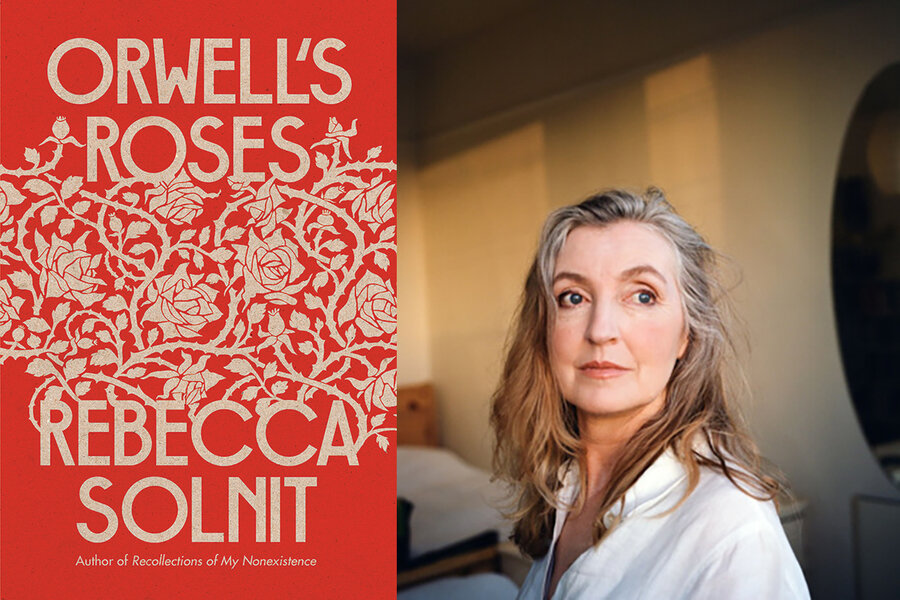Q&A with Rebecca Solnit, author of ‘Orwell’s Roses’
Loading...
American author Rebecca Solnit used to think that George Orwell, who wrote “Animal Farm” and “1984,” was a “grim, serious, and pessimistic figure.” How could a writer so zealous about exposing totalitarianism have had much time for other pursuits? In “Orwell’s Roses,” she challenges many people’s preconceptions of the British literary giant, showing him to be a man who found solace and satisfaction in tending to gardens, trees, and even, yes, roses. Ms. Solnit recently spoke with Monitor.
What inspired you to revisit Orwell?
I found an essay [of his] called “A Good Word for the Vicar of Bray,” where he describes planting fruit trees and roses that he bought cheap from Woolworths and how coming back 10 years later, he saw them thriving. I loved the essay, and I always thought, “Oh, this is a fugitive trace of who Orwell might have been had his life not been utterly caught up fighting fascism, totalitarianism, communism, the corruption of his society, Stalinism, and all the rest.”
When I was in England, I decided to visit Orwell’s cottage in rural Wallington. The lovely people who lived [there] let me in, gave me tea, showed me the garden, and told me the roses he planted were still growing. They asked, “Would you like to see them?” That was a huge a moment for me.
I started to read Orwell’s letters and journals and biographies, and found that my picture of him was not very accurate – that, in fact, he was a passionate gardener and took immense pleasure, all of his life, in the natural world.
What effect did nature have on him?
His friend [and biographer] George Woodcock said that Orwell was like Antaeus, who drew his strength from contact with the earth. He was dedicated to opposing the evils of his time, as he saw them, and to exposing them, but he also devoted a huge amount of time to this other stuff. Most of us [think] that there’s real work and everything else is self-indulgence or distraction or triviality. What I found striking in this most serious of writers is that he clearly didn’t think this way.
You can see in his journals, his diaries, where he’s noting things down, that he’s deeply interested in what’s happening with the lettuces or what birds are flying through and what the weather is doing. It was an example of somebody understanding that in order to do the work, you have to take care of yourself.
Is there a lesson for us in the way Orwell lived his life?
I have spent a lot of my life among activists, and I’ve often seen newcomers think that somehow this is a short-term job and throw themselves into it so hard they’re going to burn out. [Orwell] would go do these very intense things, including fighting in the Spanish Civil War, but then he would come back and do other things.
Do the public and private Orwell mesh in your mind?
It’s not that Orwell was giving a false impression of who he was or what his values were. It’s that we have assumptions about how anybody who stands up against totalitarianism, who leads a life of passionate conviction, has to be.
The most surprising thing was to reread “1984” and find a really different book. We all know [protagonist] Winston Smith rebels against Big Brother and the totalitarian state he lives under, but what is the nature of that rebellion? The very first thing he does is begin to write in a diary – a beautiful book he bought in an antique store – and the sensuality of creamy paper and writing with an old ink pen is described. Sensory pleasure and private, interior experience are already dangerous acts of rebellion.
What do Orwell’s roses actually look like?
Just before publication [of my book], the residents said that they were no longer so confident those were his roses, but the roses do correspond in many ways to what Orwell planted [in that location]. They were big, straggly roses. One of them pale pink. One was a bit richer pink with yellow at the base of the petals. They were kind of exuberant but also straggly and very much their own – not overly pruned and trained.







